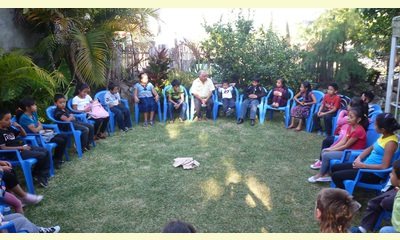|
|
A school for peace inaugurated in the Maya world in the Guatemalan highlands
un articulo por Pilar Rocio, Escola Cultura de Pau, Barcelona
This school for peace, designed, coordinated and executed by Don Francisco Puac Bixcul guide and native researcher from San Pedro La Laguna, emerged from the need of vindication and revival of ancestral knowledge of indigenous groups in the Guatemalan highlands. It is entitled "Looking for cultural and spiritual traces of our Mayan ancestors "

Grandfather Don Francisco and all the children around him
click on photo to enlarge
On January 20, 2014 the school was opened in the MAYAB cultural center in the Xetawal Sector of San Pedro La Laguna, Sololá Department in Guatemala, with the participation of 13 girls and 13 children as direct beneficiaries of educational exchange. But its main function is to involve the families and the community as a whole.
The premise of this wonderful project is to fully educate children and youth in the Mayan culture, worldview and spirituality, claiming and developing the Mayan identity and making extensive knowledge, legacy, documents and sacred practices to future generations. Its clear intention is to not allow knowledge to be lost in our society with its increasing globalization, but instead to retrieve the traditional knowledge and extend it to other areas of life and community.
The project includes five phases that will be incorporated in villages surrounding the sacred Lake Atitlan ( Atit : GRANDMA, ' lan : TRUE ), and is expected to be operational by 2018 with the same educational tasks in San Juan La Laguna, San Pablo La Laguna, San Marcos La Laguna and Santiago Atitlán in the order listed and incorporated year by year.
The operation of the School founded by Don Francisco encourages and invites the community to encourage the recovery of sacred places and energy as well as supporting the National Commission for Sacred Places of Guatemala for its formalization.
The tasks, among others, will be the formation of spiritual guides in each municipality, the training and education for children, women and men in Mayan cosmology, publishing manuals that compile fundamental knowledge for the promotion and development of life in society, in harmony with nature, as our ancestors have done, and fundamentally, a return to the practices, ceremonies and philosophical principles in accordance with the meaning and use of the calendar, identity and autonomy granted to this group of people.
All sectors of the village San Pedro La Laguna are very grateful and enthusiastic about this project which, in the course of only one month has already involved more than 30 children ... " Maltiox Atit ' " which means " Thank you Grandma "
(Click here for a Spanish version of this article)
|








|
DISCUSSION
Pregunta(s) relacionada(s) al artículo :
The understanding of indigenous peoples, Can it help us cultivate a culture of peace?
* * * * *
Comentario más reciente:
:
Two articles in recent years in CPNN point to the renewed recognition of the importance of indigenous knowledge and traditions to help save us from the ecological disaster of the global industrialized economy.
In the article preparing for the upcoming People's Summit in Rio (See CPNN April 12, 2012), Fabiola Ortiz emphasizes the importance of involving indigenous peoples in the decision-making about development projects.
The indigenous peoples of the Amazon made this argument very dramatically and eloquently in person at the World Social Forum in Belem, Brazil, as described the CPNN article of February 6, 2009.

|
|









